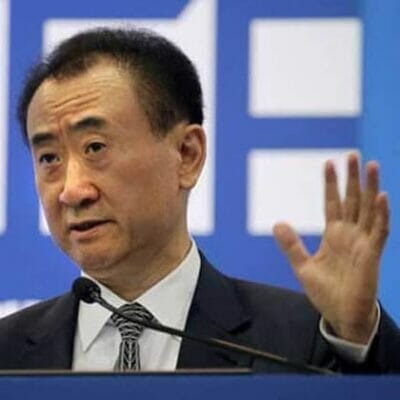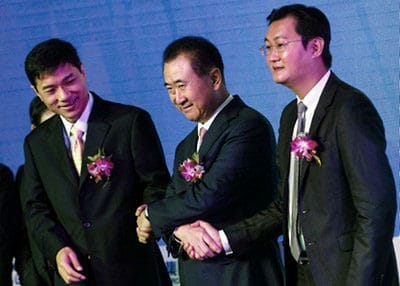
Wanda’s Wang Jianlin just took in $5.4 to combine online and offline
Wanda boss Wang Jianlin has been selling properties in the UK, Australia and mainland China to help lessen his debt load, and now the owner of China’s biggest commercial developer is selling off nearly 14 percent of his flagship commercial property unit to some of the mainland’s biggest Internet and retail players, while vowing to transform that company from a builder to an online to offline service provider.
In a statement today, Wang’s Dalian Wanda Group revealed that it is selling a 14 percent stake in Dalian Wanda Commercial Properties, which has a portfolio of nearly 240 shopping centres across China to an investor group led by Tencent, which produces the WeChat app, along with ecommerce heavyweight JD.com, electronics retailer Suning and established Wanda partner Sunac China Holdings in return for RMB 34 billion ($5.37 billion).
Also today, Wanda revealed that it is selling a pair of Australian properties for $315 million in cash, along with assumption of debt as part of a sell off of its overseas property assets.
Wanda to Stop Property Development Business
In the statement posted on the company’s website, Wanda presented the share sale as part of a transformation of the company from a real estate developer into a commercial management company focused on integrating online and offline consumption.
As part of the transaction, Dalian Wanda Commercial Properties will be renamed as Wanda Commercial Mangement Group, with the company saying that it will cease its property development business to focus on commercial management.
That transformation and rebranding does not seem to translate into an end to the offline expansion of Wanda’s retail footprint. Instead the new partners may take a key roll in bankrolling new malls with the statement indicating that “Tencent, Suning and other investors will use their financial prowess to continuously support Wanda Commercial to speed up its growth, helping the company to achieve its goal of 1,000 Wanda Plazas in China as early as possible.”
O20 Could Lead to New IPO
With the commercial real estate unit still privately held after a 2016 buyout led by Wang, Wanda now indicates that the partners are intent at relisting the company at the earliest opportunity.
After its rebirth the company expects that “Wanda Commercial Management Group will utilize the huge online resources owned by Tencent, Suning, and JD.com, and its own vast offline commercial assets to carry out various collaborations, jointly building a “new consumption” model in China that will integrate both online and offline services, providing Chinese consumers with a more intelligent and more convenient shopping experience, and generating a win-win situation for both brick-and-mortar businesses and Internet companies.”
While not an online player, Sun Hongbin’s Sunac took a key role in bailing out Wanda last year with the top five mainland residential developer agreeing in June to pay RMB 43.8 billion and take over RMB 45.4 billion in debt in return for a 91 percent stake in 13 Wanda tourism projects in China. Sunac has also invested more than $2 billion in struggling online media group Le Eco.
Transforming a Mall Builder into an Omnichannel Giant

Last year Pony Ma (right) partnered with Wanda’s Wang Jianlin (centre) and Baidu’s Robin Li on another O2O deal to 2014
In addition to creating the new retail model, Wanda also hopes to use its revived relationship with Tencent to bounce back from some recent online failures.
In the statement Wanda noted that, “Tencent will pursue a strategic cooperation with Wanda Group’s Internet Technology Group, and meanwhile Wanda Group will have primary responsibility for the online-offline integration.” This new partnership comes after mainland media reported less than one month ago that Wang’s Wanda Network Technology Group was reducing its workforce to 300 from 6,000.
Wang will be hoping that this latest attempt at an O2O partnership with Tencent is more productive than the earlier joint effort between Pony Ma’s social media powerhouse and Wanda’s brick and mortar empire.
In 2014 Wang was appearing with Ma and Baidu’s Robin Li at events to launch the ffan O2O platform in what the partners termed a $3 billion joint venture.
Baidu and Tencent quietly exited that attempt to meld Tencent’s hundreds of million of users, and Baidu’s search dominance with Wang’s fleet of malls in 2016 with Wanda taking over 100 ownership of the ffan platform. At a news conference last month, Wang declined to respond when asked about reports that Ffan had already cut more than 70 percent of its staff.
Leave a Reply